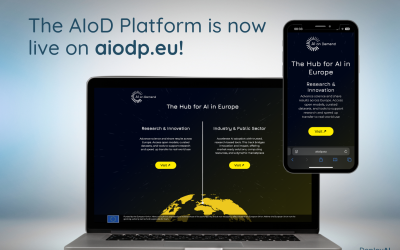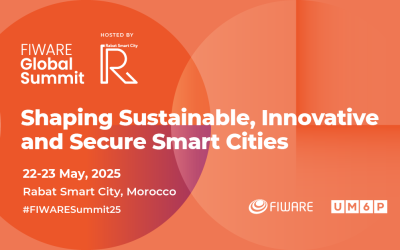Following the recent Communication from the Commission to the European Parliament, the Council, the European Economic and Social Committee and the Committee of the Regions, the FIWARE Foundation warmly welcomes the Commission initiative on the free flow of data and support the principles laid out in the Communication, notably on minimising the lock-in effects and promoting the use of open APIs for reliable identification and exchange of data.
The document points out how data has become an essential resource for economic growth, job creation and societal progress. With an estimated value of EUR 257 billion, the EU data economy has increased to EUR 272 billion in 2015. If policy and legal framework conditions for the data economy are put in place in time, its value would increase to EUR 643 billion by 2020, representing 3.17% of the overall EU GDP.
The optimisation of processes and decisions through data analysis is unfolding as a global trend with enormous potential in various fields, from health, environment, food security, climate and resource efficiency to energy, intelligent transport systems and smart cities.
The Data Economy typically engages different market players –manufacturers, researchers, infrastructure providers– collaborating to ensure that data is accessible and usable, enabling them to extract value from it, by creating a variety of applications with a great potential to improve daily life in areas such as traffic management, optimisation of agricultural or industrial production, or remote health care.
There are 28 national laws today, ruling data protection along the EU. Under the General Data Protection Regulation, there will be one single pan-European set of rules. According to President Juncker “Parliament, Council and Commission agreed in May this year on a common European data protection regulation. This is a strong European law that applies to companies wherever they are based and whenever they are processing your data. Because in Europe, privacy matters. This is a question of human dignity."
At the same time, restrictions on the free movement of data are likely to constrain the development of the EU data economy. In the Digital Single Market (DSM) strategy, the Commission announced that it would propose an initiative to tackle restrictions on the free movement of data for reasons other than the protection of personal data within the EU and unjustified restrictions on the location of data for storage or processing purposes. Unjustified restrictions may expand as the data economy grows and this could negatively impact all sectors of the economy, which could have difficulties accessing more innovative and/or cheaper data services. This risks fragmenting the market, reducing the quality of service for users and reducing the competitiveness of the data service providers, especially smaller entities.
The data-driven economy and society implies an ever-increasing amount of data, generated by machines or processes based on emerging technologies, such as the Internet of Things (IoT), the factories of the future and autonomous connected systems that usually can be accessed remotely. The enormous diversity of data sources and types, and the rich opportunities for applying insights into this data in a variety of domains, including for public policy development, are only beginning to emerge. To benefit from these opportunities, both public and private players in the data market need to have access to large and diverse datasets. The main issues in relation to the economic value that is being generated would be: access and transmission to the data; rules on liability for any damages resulting from a fault in a connected device or a robot; and portability and interoperability of the data.
The Commission's objective is to create a clear and adapted policy and legal framework for the data economy, by removing remaining barriers to the movement of data and addressing legal uncertainties created by new data technologies. Further focus would be to increase availability and use of data, fostering new data business models and improving the conditions for access to data and the development of data analytics in the EU.
‘Building a European data economy’ Communication explores the following issues: free flow of data; access and transfer in relation to machine-generated data; liability and safety in the context of emerging technologies; and portability of non-personal data, interoperability and standards. To set out suggestions for experimenting with common regulatory solutions in a real-life environment, a public consultation has been launched in parallel to the Communication.
Regarding FIWARE, the main point of the communication would be the one called ‘A future EU framework for data access’ (point 3.5). It focus on providing a coordinated approach that ensures access to machine-generated data, to avoid the risks of creating fragmentation, hindering the operation of cross-border data services and technologies in the internal market, thus slowing the development of the EU data economy.
Accordingly, the Commission has started a dialogue with Member States and other stakeholders to explore a possible future EU framework for data access. Two pivotal points of this dialogue would be:
· Minimise lock-in effects: “The unequal bargaining power of companies and private individuals should be taken into account. Lock-in situations, especially for SMEs and startups and private individuals, should be avoided.”
Open platforms enable faster innovation, facilitate interoperability, allow the reuse of applications and avoid vendor lock-in. In addition, users can fully benefit from open innovation ecosystems of developers and start-ups”. Open platforms, and particularly FIWARE, “will contribute in making the European Digital Single Market a reality, and help innovation and entrepreneurship to thrive in the EU”, as Commissioner Günther H. Oettinger pointed out last year, presenting FIWARE as a key part of the EC strategy.
· Fostering the development of technical solutions for reliable identification and exchange of data: “Traceability and clear identification of data sources are a precondition for real control of data in the market. The definition of reliable and possibly standardised protocols for persistent identification of data sources can be necessary to create trust in the system. Application Programming Interfaces (APIs) can also foster the creation of an ecosystem of application and algorithm developers interested in the data held by companies. APIs can help firms and public authorities to identify, and profit from, different types of re-uses of the data they hold. On this basis, broader use of open, standardised and well-documented APIs could be considered, through technical guidance, including identification and spreading of best practice for companies and public sector bodies. This could include making data available in machine-readable formats and the provision of associated meta-data.”
FIWARE is enabling a new generation of smarter applications which exploit large scale, real-time context information. The combination of NGSI version 2 and harmonized data models enables portability and interoperability of solutions. As a result, a myriad of end-user applications can seamlessly work across Europe and interoperate in different scenarios.
Within this hyper-connected framework, security matters: recently, FIWARE announced a collaboration agreement with CEF Digital, the main EU programme supporting the establishment of trans-European digital infrastructures following the Digital Single Market strategy. FIWARE and CEF digital are collaborating to accelerate the testing of secure message exchange in different sectors. A first CEF building block (eDelivery), will become integrated as Generic Enabler of the FIWARE Platform, allowing developers, service providers and experimenters to deploy and run it on the FIWARE Lab, and to download and deploy it from the FIWARE Catalogue. CEF makes available up to EUR 300 million in grants until 2020. These grants are used for digital enablement projects, many of which use CEF eDelivery.



